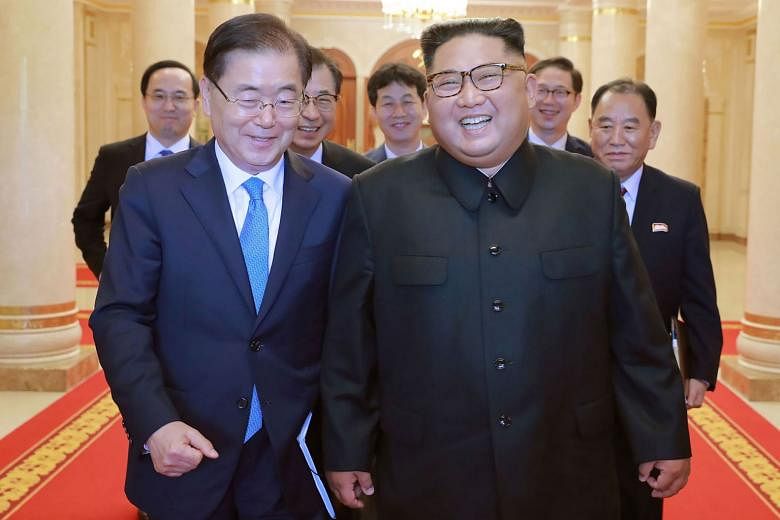SEOUL - South Korea has high hopes that the upcoming inter-Korea summit will achieve a decisive breakthrough in the stalled nuclear talks, when their leaders sit down to discuss specific measures for the North to abandon its nuclear weapons.
This is according to national security chief Chung Eui-yong, who travelled to Pyongyang to meet North Korean leader Kim Jong Un last week to discuss Mr Kim's Sept 18-20 meeting with South Korean President Moon Jae-in.
Speaking at the opening of the Seoul Defence Dialogue on Thursday (Sept 13), Mr Chung said the two leaders will assess the progress of implementing the Panmunjom Declaration agreement they made in April to boost ties and cooperation, and discuss "in-depth and specific" denuclearisation measures.
"Just as the dialogue between the United States and North Korea reached a temporary impasse, the leaders of the two Koreas agreed to discuss substantive measures pertaining to denuclearisation," the security advisor to President Moon said in his keynote address.
"This is an illustration of Chairman Kim's expectation for President Moon and the Republic of Korea to play a significant role in the denuclearisation process," he said.
Mr Chung, who has travelled twice to Pyongyang to meet Mr Kim this year, said the North Korean leader is "eager to actively communicate" his commitment to achieve denuclearisation within US President Donald Trump's current term, which will end in January 2021.
The two leaders first met in Singapore in June this year, and talks are underway for a second summit.
"Chairman Kim also underlined that his deep trust towards President Trump remains unchanged... he expressed his strong willingness to resolve the long-standing hostilities between North Korea and the United States," said Mr Chung.
He also reaffirmed that an inter-Korea liaison office will open from Friday (Sept 14) in Kaesong, a border town in North Korea.
"This means that the two Koreas now have a very stable channel of communication for the first time in the history of national division," he said, adding that the "silly days" of communicating with loudspeakers across their joint border are over.
Into its seventh year, Seoul Defence Dialogue is a multilateral forum that drew officials from 51 countries including the United States, China, Japan, Germany, Indonesia and Singapore. This year's theme is Sustainable Peace: From Conflict to Cooperation.
During a plenary session about denuclearisation, Rand Corp's senior political scientist Andrew Scobell raised the issue of creating a new "Korean model" of denuclearisation, with "a brand new playbook and road map".
North Korea had earlier protested violently when US national security advisor John Bolton suggested applying a "Libyan model" of nuclear disarmament on the regime, aghast at how former Libyan dictator Muammar Gaddafi died brutally after giving up nuclear weapons.
Dr Scobell described the North Korean situation as "extremely difficult", pointing to a wide gap between Washington's demands for concrete action first and Pyongyang's preferred phased approach with early rewards.
"As we grapple with the challenge of denuclearising North Korea, we should certainly learn from other instances of denuclearisation. But it is less about which model is best, the South African model, the Ukrainian model, or the Libyan model, and more about developing a distinctly Korean model," he said.
"North Korea is more complex and more daunting than any prior instances of denuclearisation. It's literally unprecedented. That is why it's best to start talking about a Korean model of denuclearisation."
Dr Scobell also suggested putting together a new team of arms control experts for North Korea's denuclearisation, adding that the process will take years to complete.
Other panellists urged the international community to play a collective role to help steer North Korea towards denuclearisation.
Dr Feodor Voitolovsky of the Russian Academy of Sciences noted that North Korea may not have the necessary technology or financial resources to stop its nuclear reactors. Russia can help by sharing its nuclear technology, he said.
"Russia is highly and openly supportive of efforts of South Korea and the US in pursuing dialogue with North Korea. But to sustain the process, we need to rely on a multilateral approach," he said.


